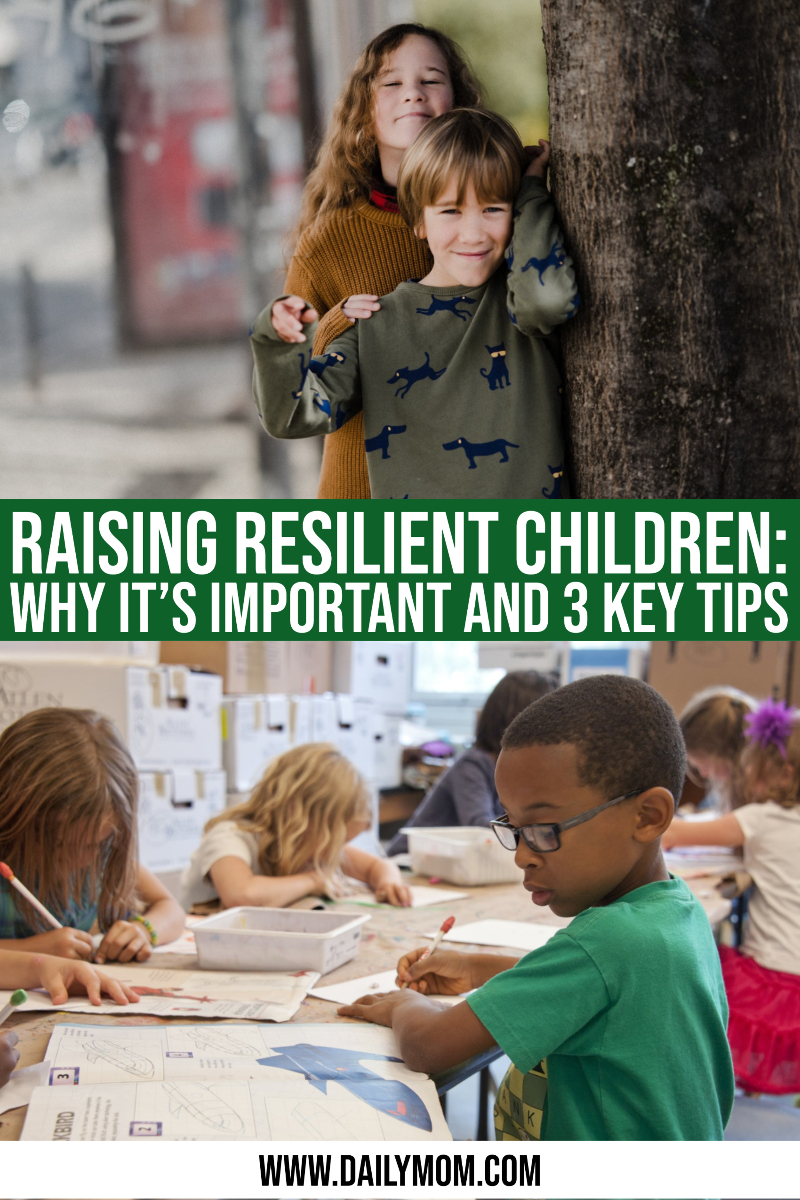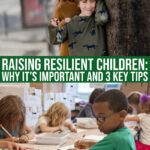Children are especially resilient. They are adaptable and flexible. They are also remarkably strong and have the ability to come back from the most difficult situations. While some children do seem to be inherently resilient, resilience is not something someone has to be born with. Parents can cultivate and nurture resilient children by teaching them a few key skills that they can carry with them throughout the rest of their lives.
What Resilient Children Look Like
You hear the term resilience or resilient children, but what does that actually mean? To boil it down, being resilient means being able to recover quickly from a difficult situation. It means having a degree of toughness and the ability to be flexible. Resilient children can deal with stress and cope with anything from high-pressure situations to everyday challenges. They know how to solve problems. They can recover from disappointment. They are able to cope with difficulties. They can also effectively set realistic goals and make a plan to accomplish those goals.

Just look at how children dealt with spending a year at home in the midst of a global pandemic. Like the adults in their lives, they lived in isolation with little human contact besides the people in their households. But they had to do it while going to school online and navigating how to learn virtually. It was not always easy, but kids really showed up and made the best of a tough situation. That is really something extraordinary. That shows how resilient children can be and how important resilience is for getting through difficult things.
READ MORE: 8 Healthy Habits of a Sound Mind
Why it is Important to Nurture and Develop Resilience in Children
As a parent, you want to protect your children from anything bad that could happen to them. While your job as a parent is to take care of and protect your children, you cannot protect them from every tough situation, problem, or trouble. Bad things are going to happen. Sometimes those bad things are small like losing something that was important to you, an annoying classmate or coworker, or too many things to get done without enough time to do them all.
Other times those bad things are bigger like a breakup, the death of a loved one, or some really traumatic experience. Then there is everything else in between – those situations that really warrant some problem-solving skills or some flexibility to navigate.

READ MORE: 50 Self-discovery Journal Prompts
Raising resilient children does not mean leaving your children high and dry to figure it out on their own. Take living through a pandemic. Children certainly did not do it on their own. Parents and teachers were there to support them and help them along the way. With that support, many children were able to figure out how to best cope with the situation at hand. That is the importance of nurturing and developing resilience.
Teaching the skills needed to get through tough things, modeling resilient behavior, and letting children work out problems on their own, will not only teach them to deal with tough situations now will also set them up to be resilient adults who can navigate the everyday challenges that come with being an adult.
Three Key Tips for Raising Resilient Children
1. Let children find solutions for themselves.
As much as it is tempting to swoop in and save the day with all the answers to your children’s problems, do not do it! When problems arise, give them the opportunity to figure out a solution themelves so that they can begin to develop problem solving skills. Instead, ask guiding questions to help them get to a solution on their own.
For instance, if your child is having problems with a friend, ask things like, “what would make you feel better in this situation?” or “what about this do you think made Sara mad?” Then let them work through it. Eventually, ask what they could do to make things better. Talking through the problem while letting your child be the one to supply the answers and be the one who thinks it through is the perfect way to help them develop the skills to solve problems on their own. Next time there is a problem (or a few problems later), you will find that you have to ask fewer guiding questions before they find a solution.

Even young children can start to develop simple problem-solving skills, so do not wait to start nurturing these skills until you get into the middle school or high school years. When you have a conversation with your four-year-old about what they think will make it easier to sleep in their own room at night, you are not only giving them ownership of the problem, you are also letting them think through what would be the best solution for them (you may be surprised that their solution is something entirely different than what you would have suggested).
The other reason problem-solving skills are important for raising resilient children is that it also helps teach flexibility. Flexibility is key when it comes to resilience. While talking things through, your child may have to come up with more than one solution. Maybe the problem itself is that something has changed and they need to pivot and change direction. Sometimes the first solution does not work out and they will have to go back to the drawing board and come up with an entirely different solution (maybe the thing that your child thought would make Sara stop being mad was not the thing this time around).
READ MORE: How Mind Wandering and Creativity Can Positively Impact Your Child
2. Teach children about their emotions.
Someone cannot cope with stress or recover from a difficult situation easily if they do not understand their emotions. In order to raise resilient children, you need to teach them that emotions are okay. They need to know that all emotions are okay. They need to understand that it is okay to be upset, angry, sad, depressed, happy, excited, anxious, and anything else they feel.
The key here is not just understanding the emotion, but being able to think through and understand what to do about those emotions. If your child is mad and disappointed that they got a poor grade on a math test or did not get picked for a team they tried out for, they need to recognize those feelings and then think about what they are going to do to process and move forward from those emotions.
A good way to help nurture this skill in order to nurture resilient children is to sympathize with your children. Let them know that you understand how they are feeling. You could say something like, “I understand how you are feeling. I would be disappointed if I were in your shoes. Now you have to figure out what you are doing to do next.” You may need to go back to the problem-solving skills and ask some guiding questions to help them figure it out.

Again, this is also something that can be practiced with young children. A child who throws a tantrum because they do not want to share a toy can be told, “I know you are upset because that is your favorite toy and you want to play with it, but it is not okay to yell and kick when you have to share.” At this age, it is about laying the groundwork and nurturing emotional management that will lead to raising resilient children. It may seem obvious and a little silly to say, but teaching a toddler that it is not okay to hit or scream when they get mad will help them to manage anger as they get older.
READ MORE: Emotional Regulation: 6 Simple Ways to Help Your Child
Young children need to learn names for the big emotions that they have because there are times that they may not understand how they are feeling or even be able to name the emotion they are feeling. Then they need to learn what is and is not an appropriate way to express those emotions. Just saying it is not okay to hit is not enough to nurture resilient children. Parents need to take it to the next level and say something like, “it is not okay to hit when we are angry.” This way children understand that they wanted to hit because they were feeling angry. Then they can be taught other ways to cope when they feel that way.
3. Model what you are trying to teach your children.
All the guiding questions in the world are not going to make a difference if children watch their parents do the exact opposite. If you are frustrated and frantic because you have conflicting deadlines at work and a coworker who is supposed to help you but is not, so you flip out all over the place when you get home, your children will remember the freak out over the times you calmly sat and asked them what they should do about the group project that has become a solo act. Do not undo all the work you put into nurturing your amazing resilient children.

If you are having a problem that is appropriate to talk about with your kids, show them that you do the same things you tell them to do when you are faced with a problem. This can make for good dinner conversation.
Over dinner when you ask how their day went, you can talk about how you had a lot of work piled on you and it stressed you out. Talk about how you were mad at first and wanted to yell at someone, but instead, you took a deep breath, made a to-do list, and figured out how to manage your time so that you can meet your deadline. You may find that they start to tell you about the problems they solved all on their own.
The same goes for emotions. Normalizing emotions helps nurture resilient children who understand and can deal with the emotions they feel. Talk openly about your feelings and how you manage them. This does not have to happen on a daily or even a weekly basis. Just make sure it is something that you talk about so that they can see it in practice.
Ignoring difficult situations and burying emotions has never gotten anyone very far. By teaching your children how to handle tough situations, you are teaching them to become resilient adults who can manage even when life gets what feels like a little too difficult. Because let’s face it, that happens to everyone. It can be tough nurturing resilient children and feeling like you are watching them struggle, but being there to support them through it and teach them how to manage things like that will make them stronger in the long run.
WANT TO READ MORE?
Check out this article on Why Normalizing The Benefits Of Therapy Is An Important Life Lesson.
💖 NEWSLETTER: DAILY READS IN YOUR INBOX 💖
Sign up to receive our picks for the best things to do, see and buy so you can relax and focus on more important tasks! Let us help you be the best version of yourself you can be!
GET MORE FROM DAILY MOM, PARENTS PORTAL
Newsletter: Daily Mom delivered to you
Facebook: @DailyMomOfficial
Instagram: @DailyMomOfficial | @DailyMomTravel | @BestProductsClub
YouTube: @DailyMomVideos
Pinterest: @DailyMomOfficial
📌 LOVE IT? PIN IT!📌

Photo credits: unsplash.com










































